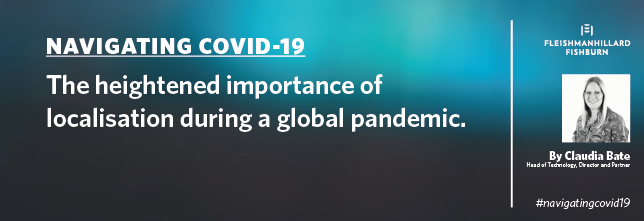The heightened importance of localisation during a global pandemic

By Claudia Bate, Head of Technology, Director and Partner
I consider myself very lucky to have lived and worked in London, Paris, Rome and Singapore during my career. I have experienced different working cultures and approaches that have helped to shape my perspective and the counsel I now bring to my clients.
Having advised technology brands headquartered all over the world – in UK, Germany, US, Singapore, China, Taiwan and Japan – I have always believed in the power of global brands that understand the importance of adapting their communications to align with the priorities of international stakeholders, from customers to partners and suppliers, employees and investors.
While every organisation will have its own priorities, it is clear there is no “one-size-fits-all” approach, and communications messages need to be adapted to work effectively in different markets. As we navigate the global COVID-19 pandemic, this mantra applies now more than ever.
We know that different countries are experiencing the pandemic in different ways – and while there is a shared experience that pervades the consumer consciousness on a global level, the significant variations in national responses, regulations and policies – combined with varying timelines – provide a diverse set of challenges to businesses and their customers around the world.
While it’s important for organisations to take a consistent approach, with the CEO leading from the front in terms of shaping a company’s response to the pandemic, it has never been more critical for brands to shape localised, nuanced messages that will resonate with international audiences.
For example, as things begin to tentatively return to relative normality in some parts of Asia and conversations begin to shift to recovery, many European nations are still experiencing strict lockdown measures. The way a brand approaches its communications simply must reflect this.
In just a few short months, the pandemic has changed our perceptions to a degree typically seen only over years and decades. This shift is likely to last well beyond the initial shock to societies and economies as personal experiences shape the way we think and behave in years to come.
Our global research shows that 73% say the pandemic has already changed the way they see the world, and 68% report that it has changed the products and services they once thought were important. This will undoubtedly have a significant, and long-lasting, effect on business.
Furthermore, our recent survey highlights that while 85% agree that major corporations have a role to play in responding to the Covid-19 pandemic, only 30% agreed they are currently performing to a high standard. However, the data varies significantly by region – with respondents in China holding an entirely different view to those in Europe at that point in time – as you might expect.
While we are united by a sense of uncertainty around the world, the way we think, feel and act in any given moment differs greatly by market. Global technology brands need to be agile enough to understand and address these differences more than ever before.
We cannot predict the future, but we know that navigating the recovery from this pandemic will require deep audience insights and an agility to flex messages and campaigns according to the situation as it unfolds. This will require careful handling, led by in-market communications experts.
Now is the time for localisation, not globalisation.
Find out more in our exclusive FH Tech global report. Read it here: Recovery & Resurgence Communications
Find Out More
-
The Patient Engagement Gap Your Competitors Are Closing
February 27, 2026


